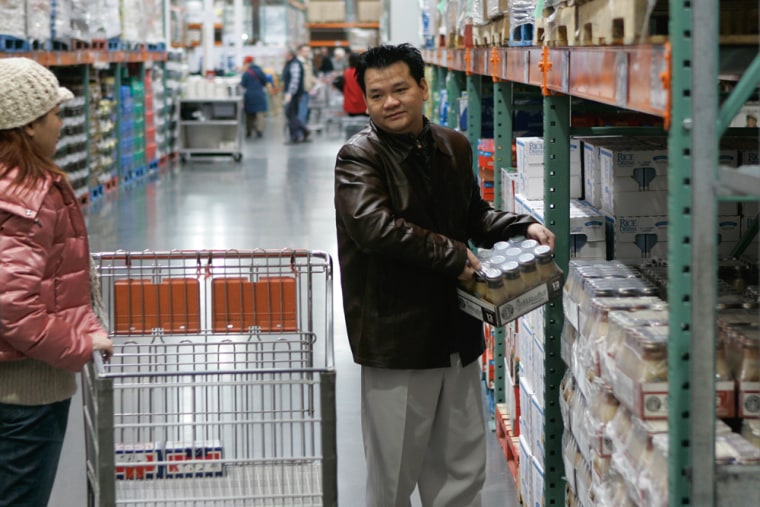Even in this caffeine-soaked city, there are times Tommy Key can’t make it to a Starbucks for his favorite pick-me-up.
On those grim mornings, Key’s preferred stand-in is Starbucks’ bottled Frappuccino, a cold milk-and-coffee concoction that he grabs on his way out the door.
“It’s a quick fix, is what it is,” Key, 43, said as he loaded a 12-pack into his cart at a local Costco warehouse. “This will last me a good month or two.”
Hurried coffee lovers like Key will have more choices for that quick fix in the coming year, as Starbucks Corp. and others angle for the growing slice of consumers who get their java from the grocery store or vending machine.
Beverage titan Coca-Cola Co. plans to push further into the ready-to-drink coffee market this summer, introducing a new iced drink under the banner of the country’s No. 2 coffeehouse chain, Caribou Coffee Co.
Coke also hopes to move another drink, the coffee-and-chocolate flavored Godiva Belgian Blends, into national distribution.
Starbucks, whose Frappuccinos and other packaged drinks dominate the market through a partnership with PepsiCo, is high on the future of its newest iced coffee offering.
The companies also are preparing to roll out a long-sought hot vending machine, which will dispense nine-ounce cans of Starbucks coffee in recyclable steel cans with insulated labels.
The flurry of activity might not exactly recall the cola wars of years gone by. But Coke’s aggressiveness shows how important coffee-laced drinks have become, along with other beverages that deviate from the traditional soda recipes.
“Any of the major beverage companies, and smaller companies as well, are aware of the consumer trends for healthier products, more variety,” said Gary Hemphill, managing director of Beverage Marketing Corp.
While carbonated soft drinks still tower over the beverage market, with a 2005 retail value of $68 billion, sales are declining for the first time in decades, Hemphill said.
Alternatives have been picking up the slack. Energy drinks and bottled water are particular leaders, but ready-to-drink teas and coffees are also players.
The packaged coffee market alone is worth just under $1 billion in the U.S., and has seen several years of double-digit growth that analysts and executives expect to continue.
Officials also point to Japan, where Coke’s Georgia Coffee brand dominates a market 12 times larger than in the U.S., said Gerry Lopez, Starbucks’ senior vice president of global consumer products.
“The American consumer has become more like the Japanese consumer in that they want to try new things. They like experimenting,” said John Sicher, editor and publisher of Beverage Digest.
“Companies like Coke and others will continue to try to crack the secret to the ready-to-drink coffee market,” Hemphill said. “A lot of companies have tried over a number of years now, with mostly limited success.”
Starbucks and Pepsi jointly operate the North American Coffee Partnership, which controls about 90 percent of the U.S. market for ready-to-drink coffee.
“If the Starbucks branding wasn’t enough to help me, I have this dynamic of people looking for this variety in non-carbonation,” said Lopez, who oversees Starbucks’ side of the venture. “It’s really the fact that the two have come together that has made it such great timing.”
And while the drinks are sold under the Starbucks brand, it’s Pepsi’s distribution system that makes bottled Frappuccinos and other drinks available in places where a Starbucks coffee shop isn’t even within driving distance.
“We’re stronger together than either of us could be separately,” Lopez said. “It’s worked very well over the years.”
Coke appears to be taking a similar tack with its newest coffee drinks.
The partnership with Caribou combines a large coffee brand — more than 400 coffeehouses, mostly in the midwest and southeast — with Coke’s bottling and distribution force.
Coke and Caribou’s first offering will be a chilled, slightly sweet dairy-and-coffee blend, said Michael Coles, chairman of Minneapolis-based Caribou. “There are several drinks that will be coming,” Coles said.
It’s a move that Coke needs to make, observers say, and one that the Atlanta behemoth has the capacity to carry out.
“The bottom line is, we’re going to see Coke more aggressive, probably even much more aggressive, in ready-to-drink coffee starting in 2007,” Sicher said.
But, he adds: “The Pepsi-Starbucks joint venture’s lead is safe for many years to come.”
